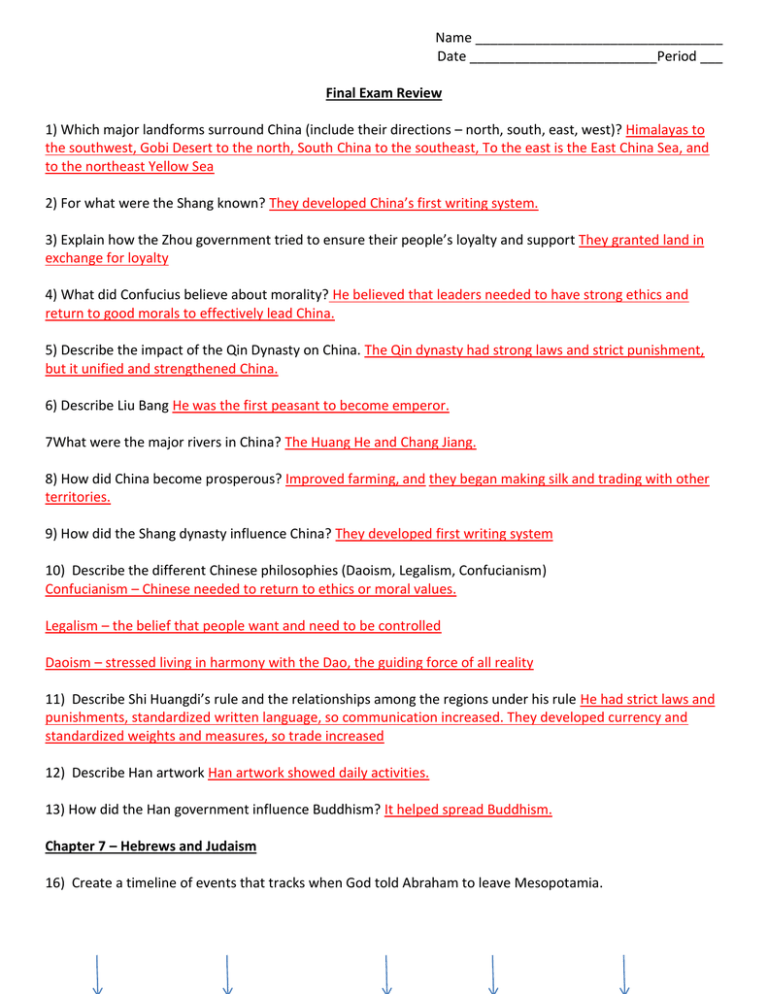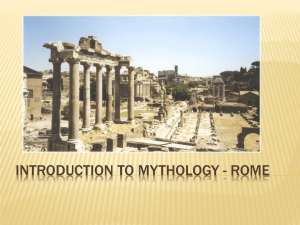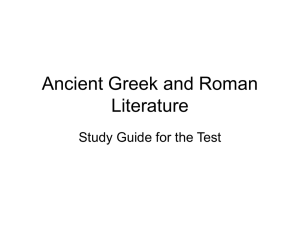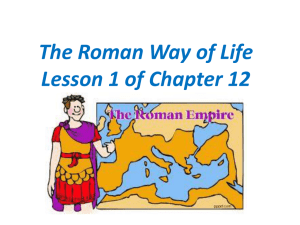Name Date ___ Final Exam Review 1) Which major landforms
advertisement

Name _________________________________ Date _________________________Period ___ Final Exam Review 1) Which major landforms surround China (include their directions – north, south, east, west)? Himalayas to the southwest, Gobi Desert to the north, South China to the southeast, To the east is the East China Sea, and to the northeast Yellow Sea 2) For what were the Shang known? They developed China’s first writing system. 3) Explain how the Zhou government tried to ensure their people’s loyalty and support They granted land in exchange for loyalty 4) What did Confucius believe about morality? He believed that leaders needed to have strong ethics and return to good morals to effectively lead China. 5) Describe the impact of the Qin Dynasty on China. The Qin dynasty had strong laws and strict punishment, but it unified and strengthened China. 6) Describe Liu Bang He was the first peasant to become emperor. 7What were the major rivers in China? The Huang He and Chang Jiang. 8) How did China become prosperous? Improved farming, and they began making silk and trading with other territories. 9) How did the Shang dynasty influence China? They developed first writing system 10) Describe the different Chinese philosophies (Daoism, Legalism, Confucianism) Confucianism – Chinese needed to return to ethics or moral values. Legalism – the belief that people want and need to be controlled Daoism – stressed living in harmony with the Dao, the guiding force of all reality 11) Describe Shi Huangdi’s rule and the relationships among the regions under his rule He had strict laws and punishments, standardized written language, so communication increased. They developed currency and standardized weights and measures, so trade increased 12) Describe Han artwork Han artwork showed daily activities. 13) How did the Han government influence Buddhism? It helped spread Buddhism. Chapter 7 – Hebrews and Judaism 16) Create a timeline of events that tracks when God told Abraham to leave Mesopotamia. 1) God spoke to Abraham 2) Promised to make his descendants into a mighty nation 3) Abraham left Mesopotamia 4) Israelites lived in Canaan for many years 5) Israelites moved to Egypt 17) Which groups controlled the Israelites? Romans, Chaldeans, and Persians. 18) Why were the Israelites freed? A series of plagues struck Egypt, which scared pharaoh, because he believed the Israelites God had sent them. 19) Describe the life of Hebrew women They only had a few rights, couldn’t inherit property, husbands were chosen by fathers, however some were military and political leaders. 20) What are the Ten Commandments? A code of moral laws which were given to Moses by God. 21) Describe the Jewish revolts against Rome and their outcomes. Jews only answered to God and refused to obey the Romans. The burning of the Second Temple convinced Jewish rebels to end the first revolt against Rome. 22) How did Judaism influence the development of Islam? The first people to follow Islam believed they descended from Abraham. 23) Describe the following Jewish holidays: Hanukkah Celebration of the rededication of the temple, miracle of the oil burning for eight days. Passover Remembering the Exodus and how the Jews were spared from the Angel of Death “passing over” their doors that had lamb’s blood to indicate they believed in God. High Holy Days Most sacred of Jewish holidays. Rosh Hashanah celebrates the beginning of Jewish New Year and Yom Kippur when Jews ask God to forgive their sins, which is honored by fasting. 24) Compare and contrast the Ashkenazim and Sephardim descendants who moved to France, Germany, and Eastern Europe kept separate traditions spoke Yiddish moved to Western Europe spoke Ladino combined traditions with non-Jewish cultures 25) Describe what happened at Masada. Romans sent 15,000 soldiers to capture Jewish Zealots,the Zealots refused to surrender at the mountain fortress, Romans broke through after two years, and the Zealots killed themselves to avoid slavery. 26) To whom does the Bible trace the Hebrew people? Abraham 27) What does the story of Ruth teach? Always take care of family, no matter what. 28) What is another name for the Hebrew Bible? Tanach 29) The language created by the Jews is called Yiddish Chapter 8 – Ancient Greeks 30) Describe how the geography of Greece impacted their way of life The rocky, mountainous peninsula made the city-states fiercely independent. They had to become master ship builders, so they could trade and get the resources they needed. 31) What happened in the agora? They held political meetings, bought and sold goods, and held religious meetings. 32) Who led Athens to their height of glory? Pericles. 33) Describe a Greek polis and where it was usually built The polis was usually built around the acropolis, a fortress. It had farms and was surrounded by a wall. 34) How did Greeks influence our language? Many English words and expressions came from Greek mythology. 35) Who were the Minoans and Mycenaeans? The first people to live in the area known as Greece, who greatly influenced later Greek cultures. They were master shipbuilders. 36) Why were Greek colonies important? They had to have colonies because they didn’t have enough resources. 37) What is a representative democracy? Citizens elect officials to represent them in government and create laws. 38) Describe the first democracy in Athens They had an oligarchy where only a few people had power. 39) Why did many ancient Greeks visit the oracle at Delphi? To ask the god Apollo questions. 40) Draw and label a compass rose and the bodies of water around Greece – see the map on p. 229 and Aegean Sea, Ionian Sea, Mediterranean Sea 41) Describe Greek mythology and how the Greeks believed the gods impacted their lives. They believed that the gods approval/disapproval would be expressed through daily activities (floods, famines, etc…). 42) Who was Apollo? God of the sun 43) Describe the Iliad and the Odyssey – two epics written by Homer that describe the Trojan War. Chapter 9 – The Greek World 45) Explain why these men were important: Xerxes I – tried to conquer Greece Darius I - tried to restore order to Persia, improved society and expanded the empire, which he connected by building roads Cyrus the Great – led a successful revolt against Medes and had a strong, loyal army. He ruled the largest empire the world had ever seen at that time. 46) Define cavalry a unit of soldiers who ride horses 47) Describe the Persian Wars A series of battles between Persian and Greece. The Greeks won, despite being outnumbered, because they had better weapons and clever leaders. Battle of Marathon – a messenger ran from 26 miles from Marathon to Athens to declare their victory (where our modern day marathons get their name). Thermopylae – narrow passage where the smaller Greek troops held off the Persians ffor three days until a Greek traitor helped the Persians defeat them. Salamis – Greek navy outmaneuvered the Persians with their smaller, faster ships in a narrow strait. Plataea – Greeks defeated the Persians again, which ended the Persian War. 48) Compare and contrast the boys in Sparta and Athens Spartan boys were focused on miliitary left to die when babies if not healthy not given much food and punished severely improved bodies and minds learned to read, write, and play musical instruments wealthy boys had private tutors courage and strength were important army from age 20-60 poor boys learned trades 49) Describe the Peloponnesian War – war between Athens and Sparta that threatened to tear all of Greece apart. Sparta declared war on Athens because they were intimidated by their power. Tried to force them to surrender by burning their crops, but Athenians used ships to bring food back to the city. The war lasted for 10 years, but neither side could gain an advantage. Ultimately, Spartans attacked again a few years later and Sparta and their allies defeated Athens. 50) Define alliance – an agreement to work together 51) Compare and contrast the women of Sparta and Athens females received little education only a few received educaiton from private tutors Spartan women had more rights ran households while men were at war couldn't serve in government couldn't leave homes received physical training own property disobey husbands or fathers 52) What modern day impact does the Battle of Marathon have on us today? The runner who ran from Marathon to Athens to declare victory, ran 26 miles, for which our modern day marathons are named. 53) Which Greek city state had the strongest army? Sparta 58) What was the Delian League? Why was it created? An alliance among the city-states to work together to protect trade and defend one another. 59) What does Hellenistic mean? Greek like 60) Who was Socrates and for what was he known? Greek philosopher who believed people should never stop looking for knowledge and developed the Socratic method of teaching. Taught people to challenge their own beliefs and questioned authority of the gods, so he was arrested and condemned to death. 61) Who is Aristophanes and for what was he known? Famous comedy writer Chapter 10 – Ancient Rome 62) How is Italy similar to Florida, geographically? They are both peninsulas 63) Why were the Twelve Tables developed? It was written to protect people’s rights 64) Where was the center of life in ancient Rome? Forum 65) Why did the Roman trade network grow? They produced more food than they could consume. 66) Which event after 88 BC had the most important effect on the Roman republic’s government? Sulla named himself dictator. 67) How did Italy’s climate affect Rome’s growth? Their mild climate allowed them to grow a variety of crops and provide ample food supply to their people and enabled their population to grow. 68) Why did the Romans overthrow their last king? What might have happened if they hadn’t? He has very harsh and killed many people. If they had not overthrown him, they probably would have rebelled and left the city. 69) How were Romans who were magistrates and Romans who took part in assemblies similar? They could both only serve for one year. 70) Why did many nearby countries declared war on Rome? They were threatened by Rome’s power. 71) How did Roman politics change after the Gracchus brothers were murdered? People viewed violence as a political weapon. 72) Who attacked Rome in 218 B.C.? Hannibal 74) Who was Aeneas and where was he from? According to Roman legend, Aeneas was a hero from Troy. 75) Define the following terms (know their jobs and importance): Senate – advised consuls, served for life, gained control of financial affairs Consuls – most powerful magistrates who led the government and army, judged court cases Plebeians – common people of Rome Tribunes – had the ability to veto and could only serve for one year 76) Rome’s last three kings were Etruscan. 77) Describe how the Punic Wars began and who was involved The Punic Wars were between Carthage and Rome, and they began in Sicily, where the Romans defeated them after 20 years. In 218, Hannibal attacked Rome, but the Romans sent troops to attack Carthage. After Hannibal returned to defend his city, his troops were defeated. The Romans destroyed Carthage in the final battle. 78) Which culture greatly influenced the Romans? Greeks Chapter 11 – Rome and Christianity 79) What did Octavian do after Caesar’s death? He worked to capture Caesar’s murderers. 80) Why were Roman roads built? To connect the empire and make it easier to defend 81) What factors helped spread the Roman language? The wrote, conducted business, and kept records in Latin. 82) What did the emperor think would happen by banning Jewish rituals? The Jews would give up Judaism 83) Why did Roman emperors by the end of the AD 100s start giving up land the Roman army conquered? The empire was too large to manage. 84) Why did the Romans make payments to the Goths? To keep them from attacking Rome 85) How did Theodora impact the riots during her husband’s rule? She helped the emperor put an end to the uprisings 86) What land did Julius Caesar conquer between 58 B.C. and 50B.C.? Gaul 87) Describe the importance of arches in Roman architecture? The Romans were able to build many lasting structures because the arches helped strengthen the structures. 88) What are the Old and New Testaments? Portions of the Christian Bible. The Old Testament tells the history and ideas of the Hebrew and Jewish people. The New Testament tells the life and teachings of Jesus. 89) Why was Constantinople important? Where Constantine moved the capital of Rome in the eastern empire. 90) What language did most people speak in the Byzantine Empire? Latin 91) Why were the Romans successful in their expansion of the empire? They allowed conquered people to keep their beliefs and customs. 92) What is Christianity? A religion based on the life and teachings of Jesus of Nazareth. 93) Define messiah – God’s anointed one 94) What is the Bible? The holy book of the religion of Christianity 95) Define crucifixion a type of execution where a person is nailed on a cross 96) Define resurrection – Jesus’ rise from the dead 97) Who were the apostles? 12 disciples who Jesus chose to have special training 98) Who was Paul? A disciple of Jesus who spread Christian teaching, whose ideas helped the church break away from Judaism 99) Define martyrs someone willing to die for their beliefs 100) What is persecution? Punishment against a group because of its beliefs.






